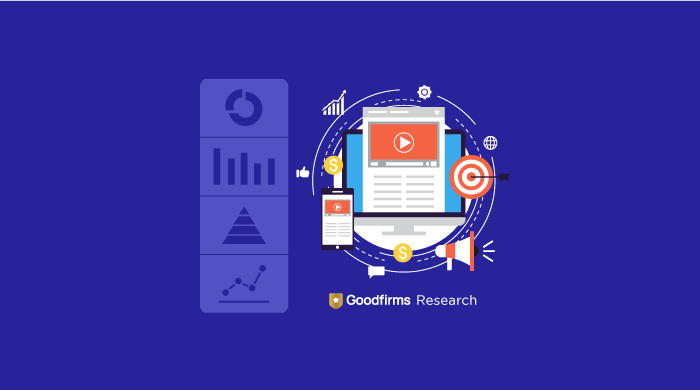Factors to Consider Before Selecting the Right Mobile Application Development Platform
The subject "On which platform to build your mobile app first" has been among the most talked about in the recent years. Similar to the cost and time of developing a mobile application, the decision to select the right platform for your organization depends on the user’s needs and priorities. Goodfirms, a full-fledged research and review platform, brings out the top considerations you must be aware of when choosing the right mobile application development platform that will address the unique needs of your organization. A study was conducted to identify the top aspects that go in deciding the right platform to develop your mobile application.
DEMOGRAPHICS
MAKING THE RIGHT PLATFORM CHOICE
How to choose the right platform to develop your mobile application? Should it be iOS or Android, the answer lies within the scope of business and what the organization wants to gain out of their mobile application. Ideally developing a mobile application on both the platforms simultaneously is the best approach but due to limitations in budget and time, many choose to start with one platform and gradually move to the other. Our survey highlights the major dynamics that are significant when deciding the right platform for your mobile application.
1. Target Audience
For more than 40% of the survey respondents the target market and the geography where the mobile app will cater to, is the most common factor before they decide to go for an app on Android or iOS. It is pivotal to identify who you want to reach out to and which platform they chose to use, before deciding on a platform. Doing through market research to understand the demographics of your users is the key towards making a successful app. Think of the audience you intend to target. Developing an app for the Asian market will draw the developers focus towards Android while if a similar functionality app wants to target the North American or the European market; they would give preference to iOS. Identifying the target market can pay huge dividends, but doing it right is the most primary and crucial step when starting the development of your mobile application.
It is important that the end user needs to be given higher priority than anything else. If you focus to develop an app targeting to reach out to global audience, ideally because Android has the most users overall, you should go with Android first, iOS following quickly. Though overall there are more Android users than iOS, still it’s important to consider the audience for which the app is being developed. Particularly for people belonging to lower or middle income groups, Android has been a preferred choice. Comparatively, iOS users typically have higher income. This is one of the indicatives of the general population. Among the most vital forms of information you should study when identifying your target audience are age, gender, socio-economic status, education, and occupation. Checking the stats to determine the percentage of Android users vs. iOS users will give your assignment a kick start as to have higher engagement so that you can immediately reach the majority of your customers. Hence, consider your potential customer’s needs as the most crucial thing.
2. Monetization Potential of the App
Generating revenue to sustain your business is the key for many of the mobile applications. Considering the costs and profit you would be making from the app is important before deciding which platform to choose from. It has been observed that there is a strong correlation between the amount of revenue generated and use of iOS as a priority platform. Businesses focusing on having high ROI tend to prioritise iOS more than low-earners do. Though there are many ways to derive revenues from Android platform, this is an important factor to be considered when developing an app. Just because Apple offers a grander and staunch user base for paid apps, having success with iOS first when developing a paid app should be the immediate goal.
3. App Budget
Nearly 20% of the responders mentioned that limitations in terms of financing the app is one of the determining factors that affect their decision to select a particular platform to start the mobile app development process. Developing for either Android or iOS is always cheaper than doing both the platforms together. So in case of budget constraints, it becomes even more vital to select the right platform for your mobile application. The amount of time it takes to build an app has a direct correlation with cost. Developing an app on the iOS platform is almost two times less time consuming than developing the same app for an Android platform.
4. Technical Features and Ease of Development
Another important factor to think of is the technical features you want to include on your app. The app may be a simple one for basic users or a more complicated one offering impressive graphics or other complex gear. The ease of development offered by each platform is decisive for the effort goes into making a certain application. With Android devices, there is a lot of fragmentation of different phones and different versions of the Android operating system. So if your app requires a lot of hardware interaction, it is suggested to go for the Android version first.
5. Potential Updates to the Platform
Choose a platform that is easy to maintain and upgrade your app easily in the future. This will not only save your investment for the future, but also keep a similar hold in the market place in the changing digital world but few years to come. The longevity of an application is the key to stay in the app store and have your users still using the app. Sustaining and improving your application by incorporating latest technologies and language upgrades is a long term long that the business must be clear before selecting a platform to start developing their mobile application. The ease to quickly update your app and adapt to the new functions in the changing business markets is the key to decide the right platform. For 15% of the survey participants incorporating the latest mobile technology into their platform updates, allowing applications to be kept up to date is critical to selecting the right platform for their mobile application.
6. Others
Nearly ten of the respondents also mentioned that the business logic and the overall scope of the app, no. of downloads and security of the application as the factors that have or would affect their decision while selecting the right platform for their mobile application. For many the core criterion of selecting the right platform for developing the mobile application circled around these along with the top mentioned above. They also highlighted that having a market hold in the future is always a concern because there is always an uncertainty about the changing mobile technologies.
Conclusion
Will developing a mobile app enable your business to reach new heights? Will the platform be stable in the coming years? These are some of the questions to be answered while choosing the platform on which you develop. The future prospects of the app platform must align with your goals for a profitable partnership. This is critical to understand because investing time and money on the wrong platform will do no good to the business. Hence understanding and correctly evaluating the long term consequences the app platform will have on your business is paramount.




